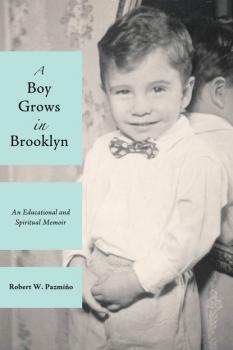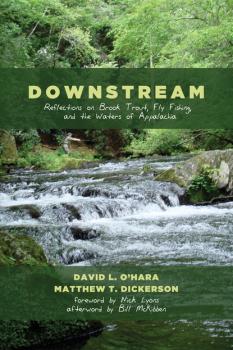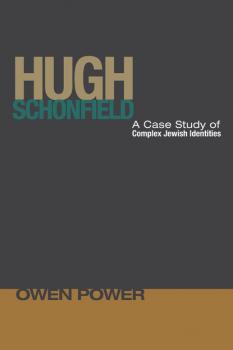ТОП просматриваемых книг сайта:
Биографии и Мемуары
Различные книги в жанре Биографии и Мемуары, доступные для чтения и скачиванияАннотация
A Boy Grows in Brooklyn is an educational and spiritual memoir that recounts stories from life in the Midwood interfaith neighborhood during the fifties and sixties. It shares spiritual lessons for living today that are applicable to readers of all ages who yearn for the joy, humor, and challenge discovered in everyday urban life. Memories of the Brooklyn Dodgers, neighborhood encounters, family roots, public and Sunday school teachers, pastors' modeling, and scouting ventures are woven together in vibrant stories to enlighten the hearts, souls, and minds of readers across every stage of life.
Аннотация
Downstream: Reflections on Brook Trout, Fly Fishing, and the Waters of Appalachia is a mosaic combining nature writing, fly-fishing narrative, memoir, and philosophical and spiritual inquiry. Fly-fishing narratives and fragments of memoir provide the narrative arc for exploring relationships between humans and rivers, and the ways in which our attitudes and philosophies impact our practices and the waters we depend on for life. The authors guide their readers on a journey from Maine's Androscoggin watershed–once one of the ten filthiest rivers in the United States and now home to some of the best wild brook trout fishing in the United States–southward through Kentucky into Tennessee and North Carolina, where a native southern strain of brook trout struggles to survive. Like the rivers themselves, the chapters alternate between flowing narratives and the stiller waters that settle out above dams. While each stone in this mosaic is worth a close look in its own right, seen from a distance the book offers a broader picture of the cold mountain waters of Appalachia and their famous native fish: the brook trout.
Аннотация
It's hard to say, exactly, what's meant by the «modern world,» but Henry Buckberry never really hooked into it. Born before the First World War and the oldest boy in a family of thirteen kids, he left the open, rolling, potholed prairie of North Dakota in 1921 for the dark, dense, dangerous woods of northern Wisconsin, where he learned to fish, trap, hunt, lumberjack, and farm. Although he lived into the twenty-first century (the second volume of these stories, A Windfall Homestead, will inch us closer to the information super-highway), it could be said that Henry played hooky from the twentieth. With a few allowances for a little new technology, like the Model T, Henry's life represents the end phase of a rural folk culture that has its roots in the Neolithic. Through Henry's stories it's possible to see a long way into the past and then to turn the telescope around in order to put the present under an improvised microscope. Henry didn't have an easy life, but he had a vivid life, a life amazingly free of boredom, aimlessness, or distraction, and his stories convey that vividness from beginning to end. Henry's son Charles Darwin Buckberry–also known as C.D. or Seedy Buckberry–interviewed Henry and arranged the stories in some sort of more or less working order. (Seedy insists he put those stories down with complete fidelity, although he refuses to take a lie-detector test or submit to a Minnesota Multi-Phasic Personality Inventory analysis.) Henry's life, as conveyed here, is also a way to measure the intellectual bulimia (or is it the intellectual anorexia?) of present-day empire consumerism. Here is life before Wal-Mart. Here is life that lives in nature with intense and even fierce physicality. Here is life that sings.
Аннотация
Trying to articulate the ways in which one's life meshes with one's own time can be perilous, yet friends have encouraged me to do just that. Nevertheless, for one oriented to serving others as teacher and mentor in a context of faith, writing about oneself seems unnatural. Yet the «self» we have been given to share embodies many others as well. So many of the encounters narrated here will open into friendships. Moreover, what spices those encounters are the places and passions they embody, so the story that emerges is hardly my own. Different places often unveiled different faith communities, each of which has altered, if not transformed, the «self» narrated here. In that respect, and in many others, my story is not mine but that of the times our generation has inhabited. Finally, it has been my religious community of Holy Cross that made these multiple transformations possible, so it is only fitting to dedicate the work to that community and the rich exchanges it continues to effect among women and men.
Аннотация
Most studies of Abraham Joshua Heschel approach him as a theologian, whereas this book peers behind the theologian and honors Heschel as the original philosopher that he was. So it unearths Heschel's epistemology, his aesthetic, and his social philosophy, all reinforced by the thirty years of friendship and dialogue that Maurice Friedman shared with him.
This book raises significantly critical questions concerning Heschel's philosophy of Judaism while remaining greatly appreciative of the sweep and command of his philosophy that Friedman believes were not sufficiently worked through.
This book raises significantly critical questions concerning Heschel's philosophy of Judaism while remaining greatly appreciative of the sweep and command of his philosophy that Friedman believes were not sufficiently worked through.
Аннотация
In this book, which continues a renowned series of essays published in the Christian Century, thirteen prominent Christian theologians speak–in unusually personal voices–of their journeys of faith and of the questions that have shaped their writing and scholarship.
Reflecting a variety of theological positions and approaches, these essays feature decisive encounters with prayer, scriptural tradition, struggles for justice, and religious and cultural diversity.
Some of these «changes of mind» include a change in denominational allegiance, others reflect a shift in method or emphasis prompted by experiences inside or outside the church. Some of the essays display a long-term theological project that unfolds or deepens in changing circumstances. All display the renewed vitality of theology in the postmodern context.
Contributors include Paul Griffiths, Sarah Coakley, Mark Noll, Nicholas Wolterstorff, Carol Zaleski, Kathryn Tanner, Scott Cairns, Robert Jenson, Emilie Townes, Peter Ochs, David Ford, Douglas John Hall, and Max Stackhouse.
Reflecting a variety of theological positions and approaches, these essays feature decisive encounters with prayer, scriptural tradition, struggles for justice, and religious and cultural diversity.
Some of these «changes of mind» include a change in denominational allegiance, others reflect a shift in method or emphasis prompted by experiences inside or outside the church. Some of the essays display a long-term theological project that unfolds or deepens in changing circumstances. All display the renewed vitality of theology in the postmodern context.
Contributors include Paul Griffiths, Sarah Coakley, Mark Noll, Nicholas Wolterstorff, Carol Zaleski, Kathryn Tanner, Scott Cairns, Robert Jenson, Emilie Townes, Peter Ochs, David Ford, Douglas John Hall, and Max Stackhouse.
Аннотация
With this book, Owen Power offers the first full-length intellectual history of the thinker Hugh Schonfield (1901-1988). Power contextualises Schonfield and his work in the spheres of Jewish ideology and Messianic Jewish politics as a means to explain the complicated nature of Messianic Jewish identity. There are many problems in making sense of the varied claims made about the Jewishness of Jewish Believers in Jesus–as there is a striking lack of agreement as to their Jewish status among halakhic authorities–and there is no real consensus among Messianic Jews themselves in answering the question, «Who is a (Messianic) Jew?» On the other hand, the attitude of many Jewish commentators regarding Messianic Jews is that they are traitors and apostates pretending to be Jews–Christian missionaries hell-bent on enticing Jews from their communities to the welcoming embrace of the Church. Normative Jewish opinion tends to treat Jewish Believers in Jesus as a monolithic group and thus fails to recognise the wide range of groups and individuals who claim to be Messianic Jews, even if there is among them little consensus as to what such a label means. Schonfield's case both reinforces such convictions and problematizes them.
Аннотация
Enlarge My Coast tells of Pastor Blackstone's return to India to see the completion of a project inspired during his first trip to the subcontinent of Asia in 2006. This time his traveling companion will be a church deacon of the Emmanuel Baptist Church, Russ Coffin. Blackstone and Coffin travel to Kerala State to help in the dedication of the new Venmony Baptist Church sanctuary and parsonage built through the support of their ministry in Maine. Once again Pastor Blackstone is able to share the wonders and wants of India through the eyes of another adventurous traveler. Enjoy with them the fascination of watching a working elephant beside a rural road; the attempt of catching on film five people on a motorcycle at one time; a houseboat ride on Kerala's largest lake; listening to Russ's first sermon; graduation day at Kerala Baptist Bible College; an Indian barbeque of pancakes and omelets; of trying to find a bell for the college in the busy and confusing markets of one of Kerala's biggest cities; and an auto-rickshaw ride through rubber tree-lined lanes, banana grove-covered valleys, and an Indian road repair crew! As in his other India books, Though None Go with Me and Though One Go with Me, share the practical spiritual lessons Pastor Blackstone learned on this, his third «India journey» and his first mission trip to the State of Andrah Pradesh as the guest evangelist for the Independent Gospel Baptist Churches of India. Share in the personal experience of a daylong journey on the infamous Indian railway into the backcountry of central India, of driving a bullock cart, eating an Indian catfish, making friends with a dog named Ellie, preaching in a thatched-roof church, being surprised by a police raid at four in the morning, and witnessing more people coming to Christ at one time than at any other time in the pastor's ministry. Journey for a month into the unpredictable land of India and enjoy the surprises around each corner as Pastor Blackstone travels to three Indian states and gets to meet fellow pastors from five states. The fellowship will be sweet, the food will be hot, and the friendships made will be eternal!
Аннотация
Joy, Despair, and Hope recaptures the power and immediacy of psalms for modern readers, showing how these biblical poems can speak to us yet again. Accompanying the author on his personal spiritual search through psalms, readers find their own inner lives given voice within these texts.
Edward Feld analyzes fifteen personal psalms from the book of Psalms, showing how each provides a different perspective on the life of faith. Feld's insights reveal how individual psalmists struggle with their faith, how they are wracked by doubt and self-questioning, and how they come finally to a greater understanding of faith. This book's clearly articulated analysis is both moving and sophisticated, helping us to enter the spiritual world of these writers, to recognize our own struggles in their ancient words, and to feel these poets alive and walking beside us. Along the way, Feld teaches us how to read psalms as poems and unlocks both their theological message and their literary splendor. Readers emerge with a new appreciation of and connection to the profound religious life and artistry of the biblical psalmists.
Edward Feld analyzes fifteen personal psalms from the book of Psalms, showing how each provides a different perspective on the life of faith. Feld's insights reveal how individual psalmists struggle with their faith, how they are wracked by doubt and self-questioning, and how they come finally to a greater understanding of faith. This book's clearly articulated analysis is both moving and sophisticated, helping us to enter the spiritual world of these writers, to recognize our own struggles in their ancient words, and to feel these poets alive and walking beside us. Along the way, Feld teaches us how to read psalms as poems and unlocks both their theological message and their literary splendor. Readers emerge with a new appreciation of and connection to the profound religious life and artistry of the biblical psalmists.
Аннотация
Does it really matter?
Does it matter if we have free will? Does it matter if Calvinism is true? And does what you think about it matter? No and yes.
No, it doesn't matter because God is who he is and does what he does regardless of what we think of him, just as the solar system keeps spinning around the sun even if we're convinced it spins around the earth. Our opinions about God will not change God, but they can change us. And so yes, it does matter because the conversations about free will and Calvinism confront us with perhaps the only question that really matters: who is God?
This is a book about that question–a book about the Bible, black holes, love, sovereignty, hell, Romans 9, Jonathan Edwards, John Piper, C. S. Lewis, Karl Barth, and a little girl in a red coat. You've heard arguments, but here's a story–Austin Fischer's story, and his journey in and out of Calvinism on a trip to the center of the universe.
Does it matter if we have free will? Does it matter if Calvinism is true? And does what you think about it matter? No and yes.
No, it doesn't matter because God is who he is and does what he does regardless of what we think of him, just as the solar system keeps spinning around the sun even if we're convinced it spins around the earth. Our opinions about God will not change God, but they can change us. And so yes, it does matter because the conversations about free will and Calvinism confront us with perhaps the only question that really matters: who is God?
This is a book about that question–a book about the Bible, black holes, love, sovereignty, hell, Romans 9, Jonathan Edwards, John Piper, C. S. Lewis, Karl Barth, and a little girl in a red coat. You've heard arguments, but here's a story–Austin Fischer's story, and his journey in and out of Calvinism on a trip to the center of the universe.










